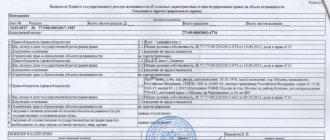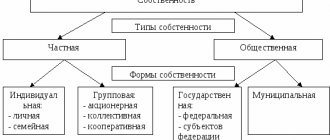The essence of registration
Rosreestr has been given the functions of administering and maintaining a gigantic set of rights and cadastral information about real estate objects - EGRN. It records records of real estate transactions - the emergence of a new property right, a change in the property in area, type, category, the division of property into shares or the consolidation of shares into a single right, etc.
Registration of title is a legal act of officially recognizing a person's right to a specific piece of real estate. After state registration, a document is issued that serves as the main evidence of existing rights: currently, such a document is an extract from the Unified State Register of Real Estate.
The Supreme Court of the Russian Federation recalled the importance of timely registration of rights to real estate
Actual topic
In modern realities, there are cases when the seller transferred real estate to the buyer under a purchase and sale agreement, the parties recorded the transfer in the transfer and acceptance certificate, but did not take steps to register the transfer of ownership. And who owns the property? Such a case was recently considered by the Supreme Court of the Russian Federation. Read more about this in the article by Anastasia Roy.
Rights to property subject to state registration arise, change and terminate from the moment the corresponding entry is made in the state register - this is an axiom of property relations, which is enshrined by the legislator in paragraph 2 of Article 8.1 of the Civil Code of the Russian Federation.
Paragraph 1 of Article 131 of the Civil Code establishes that the right of ownership and other real rights to immovable things, restrictions on these rights, their occurrence, transfer and termination are subject to state registration.
Accordingly, the right of ownership of real estate is subject to state registration and arises precisely from the moment the corresponding entry is made in the state register.
In modern realities, there are cases when the seller transferred real estate to the buyer under a purchase and sale agreement, the parties recorded the transfer in the transfer and acceptance certificate, but did not take steps to register the transfer of ownership. It is difficult to say whether this happens due to forgetfulness or legal illiteracy, but this does happen.
A similar case was recently considered by the Supreme Court of the Russian Federation: property was transferred, but the parties forgot to register the transfer of ownership. Meanwhile, the previous owner went into bankruptcy.
So who owns the property? The new owner (the right is not reflected in the register, but actually owns the property) or the previous owner (the right is reflected in the register, but does not actually own the property)?
Fable of the case
The seller transferred five non-residential buildings to the buyer under a real estate purchase and sale agreement. The buyer's ownership of the purchased objects was registered.
Subsequently, the seller, citing the buyer’s failure to fulfill the obligation to pay for the property, filed a claim in a court of general jurisdiction to terminate the said contract.
By a decision of a court of general jurisdiction, the contract was terminated, and the buyer was obligated to return the transferred property to the seller. The buyer actually returned the property according to the transfer and acceptance certificate of real estate. Only the transfer of rights was never registered.
More than a year from the date of transfer of property, the buyer was declared bankrupt and a procedure for the sale of his property was introduced.
Arbitration courts of three instances decided who should retain the property: the courts of the first and appellate instances pointed out that the statute of limitations had passed on the statement of the financial manager, the district court agreed and additionally noted that actions to return property in pursuance of a judicial act cannot be qualified as committed for the purpose of causing harm to the debtor’s creditors or with abuse of right.
As a result, the property remained with the actual owner, despite the absence of a corresponding entry in the register about his right.
Decisive and final was the Determination of the Judicial Collegium for Economic Disputes of the Supreme Court of the Russian Federation No. 310-ES21-1061 dated May 27, 2021, which sets out a position radically different from that of the lower courts.
Thus, according to paragraph 1 of Article 213.25 of the Federal Law of October 26, 2002 No. 127-FZ “On Insolvency (Bankruptcy)” (hereinafter referred to as the Bankruptcy Law), all the property of a citizen available on the day of the decision to declare him bankrupt and identified or acquired after that day, constitutes the bankruptcy estate, with the exception of property that cannot be foreclosed on in accordance with civil procedural legislation.
Since at the time of the opening of the procedure for the sale of the debtor’s property the real estate had not been transferred (due to the absence of a corresponding entry in the state register on the transfer of the right to the property), the real estate objects, on the basis of the above provision, are included in the bankruptcy estate of the debtor.
The Supreme Court of the Russian Federation ordered the actual owner to transfer all five real estate assets to the debtor's financial manager for their subsequent sale and settlement with creditors.
Accordingly, the property remains with the debtor, and the actual owner, who had the property at his disposal for 1 year and 4 months, loses the opportunity to return ownership of the property in the debtor's bankruptcy procedure. The claim for the return of property is transformed into a monetary one and is satisfied on an equal basis with the claims of other creditors in the general manner.
What if the debtor is not a citizen, but a legal entity?
The legislator has provided a similar provision for the bankruptcy of legal entities, enshrining it in paragraph 1 of Article 131 of the Bankruptcy Law, according to which all the property of the debtor available on the date of opening bankruptcy proceedings and identified during bankruptcy proceedings constitutes the bankruptcy estate.
Summarizing the above, it is necessary to highlight the main thing: rights to property subject to state registration arise, change and terminate from the moment the corresponding entry is made in the state register, and not at the time of the completion or actual execution of a transaction or the entry into force of a court decision, on the basis of which they arise, change or rights are terminated.
In simple terms, appropriate entries must be made in the state register promptly and in a timely manner in order to avoid disastrous consequences, for example, the inclusion of property in the bankruptcy estate of the debtor, whose ownership remains reflected in the register.
How to register property rights?
Procedure:
- collect the necessary documents;
- pay the state fee;
- submit documents to the registration authority;
- After the deadline has passed, pick up the finished statement.
There are nuances at every stage.
Package of documents
Identification document of the applicant. If a representative acts on his behalf, then it is also necessary to submit a notarized power of attorney.
Judgment. Copies certified by an authorized person and certified by the court seal must contain marks indicating the entry into force of the resolution/decision/ruling. Two copies are submitted, one of them is returned to the applicant after registration. The decision must indicate the real right to be registered and indicate the object with a description and characteristics that allow it to be accurately identified.
Constituent documents and power of attorney for representation, if the applicant is a legal entity.
Technical plan of the property, if it was not previously taken into account in the real estate cadastre.
Receipt for payment of state duty. The applicant is not required to provide this document, since information about the payment must be reflected in a special information system. In the absence of such payment information, documents will be returned without consideration after 10 days from the date of their submission.
Documents are submitted in originals and copies. The originals are returned to the applicant after completion of the registration procedure.
Fee and application
According to the Tax Code of the Russian Federation, the amount of payment for a government operation depends on the status of the copyright holder:
- from individuals - 2 thousand rubles;
- from organizations - 22 thousand rubles.
You can pay the fee by payment order at a bank branch, independently at any terminal or using electronic services.
An application for state registration of the established form is prepared by a specialist who receives documents.
The text of the application itself contains a request to carry out a registration action for a specific object with a specific person and provide an extract in one of the following ways - at the branch, by post, through a representative or with paid delivery by courier.
Submission of documents
Currently, you can submit documents for state registration by contacting any branch of the multifunctional center. It is also possible to submit a corresponding application using the Rosreestr public services portal.
In addition, all documents can be sent to the registration authority by mail. However, in this case, the authenticity of the applicant’s signature on the application must be certified by a notary.
If a citizen cannot use any of the methods, the procedure can be carried out with specialists from the registration authority visiting him. Please note that this service is paid.
After the expiration of the registration period established by law (5-12 working days), the applicant is notified of the registration or its suspension, indicating the reasons.
When is it necessary to file a claim for recognition of ownership rights?
The need to confirm ownership in court arises when a person actually owns a home, but for some reason cannot register it. For example, real estate documents were lost. This is especially true for property acquired a long time ago. In this case, evidence of actual ownership will confirm the legitimacy of the claims. If a person cannot provide them, the claim will be denied.
The need to go to court arises when a person has the necessary documents, but he is prevented from exercising his rights or they are challenged.
It may also be necessary to recognize ownership of an apartment in a building under construction or unauthorized construction.
Download a sample statement of claim for recognition of ownership of an apartment (92.1 KiB, 2012 hits)
Claim for recognition of ownership of a part of the house (19.2 KiB, 979 hits)
When can they refuse or suspend?
Grounds for refusal:
- the applicant is not the owner according to the submitted court ruling;
- the documents required for registration are missing;
- there are errors in the documents or the form is incorrect;
- a contradiction was discovered between the declared and already registered rights;
Also, the registration authority may suspend consideration of the application in the following cases:
- at the request of the applicant himself;
- the inspection officer has doubts about the authenticity and reliability of the information provided.
Notice of suspension is sent or served on the applicant on the day the relevant decision is made.











